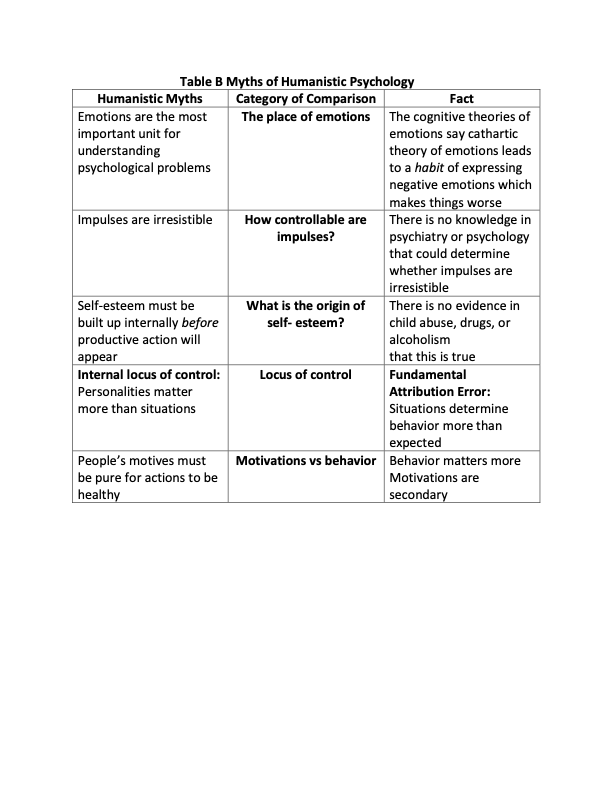As far back as the 18th century Enlightenment, the cause of psychological behavior was believed to be conscious choice after rational weighing of pros and cons.
For the Calvinists of 16th and 17th centuries, lack of willpower was considered a problem and needed to be overcome through prayer and introspection. Emotions were never taken seriously. They were seen as temporary fits of irrationality. It was not until the romantics in the hundred-year period between the end of the 18th and 19th centuries that emotions were not only taken seriously but were also considered primary. Humanistic psychology, just like the counterculture it sprang from, is directly connected to Romanticism.
The tendency of humanistic psychologists is to reduce all problems being determined by feelings which are repressed and need to be expressed. As Dawes writes, the platonic hierarchy was turned on its head. Contrary to the Enlightenment, it was rationality that was the problem. The belief is that we can only get better by allowing the magical but bratty child within to come out.
Self-esteem
Beginning in the late 1970s, poor self-esteem is often cited as the cause of everything from failure to learn in elementary school, to failures in business, to failed marriages. Nathaniel Branden's The Psychology of Self-Esteem propagated the importance of self-esteem . Instead of self-esteem arising as a result of action taken, high self-esteem was presented as a pre-condition for taking action. Diminished self-esteem stands as a powerful independent variable. But what does it matter that we know why we exercise before exercising? The behavior is more important than the motives for engaging in it. It is not necessary to feel wonderful about ourselves first. Dawes writes:
there is no evidence that for the majority of people a change in internal state and feeling is necessary prior to behaving in a beneficial way. (293)
Nevertheless, long-time state assemblyman John Vasconcellos promoted the establishment of a task force to promote self-esteem and the governor of CA, George Deukmejian, signed a bill to fund its work in 1986. The conclusions after putting these problems into practice were the following:
- There is insufficient evidence to support the belief in a direct relation between low self-esteem and child abuse.
- Low self-esteem should not be perceived as the primary cause of child abuse especially when compared to other factors such as age, employment status, availability of childcare and economic insecurity.
- There is no basis for arguing that increasing self-esteem is effective in decreasing child abuse.
- there is no evidence that lower self-esteem plays a causal role in alcoholism or drug use.
Furthermore, Dawes writes that this way of thinking about low self-esteem discourages taking action, and instead seeking talk therapy. More importantly, raising the self-esteem of children had no bearing on the academic performance of Yankees compared to students in Japan and China in the areas of geography and mathematics. Yankee students also do much less homework and have a shorter school year. They are poorer students despite the crusade to raise self-esteem in the schools. Finally, Dawes claims that attempts of schools to raise self-esteem by lowering standards hurts children in the long run.
Mental health equals living on the sunny side of the street
Humanistic psychology's picture of mental health consists of high self-esteem, optimism, feelings of invulnerability, and self-confidence - all characteristics which are internal, pervasive, and stable over time for one's own success. Conversely external locus of control, specific conditions and fleeing explanations go with one's failure. This argument may be found in Shelley Taylor's Positive Illusions: Creative Self-Deception and Heathy Mind.
By the late 1970s, the decline of Yankee capitalism had not reached the middle classes, and even working-class people could still imagine that the American dream was possible. With the proper internal characteristics - hard work, frugality, prudence and preservice - people could live the dream. But as the standard of living declined steeply for middle-class and working-class people, how psychologically healthy was it to continue to imagine you can pull yourself up by your own bootstraps? Having good reasons for being pessimistic might be healthier. If a worker is out of work because of the chaotic capitalist economy, wouldn't it be healthier to have an external locus of control which blames the system, not the individual? Nonetheless, for comfortable upper middle-class professional psychologists, the mandate they give us today is the old "pull yourself by your own bootstraps", and "don't worry, be happy" at whatever cost to one's own reality testing.
How Do Professional Psychologists get away with this?
The myth that expanding experience leads to increased learning
Part of the reason the public has gone along with the lack of the use of science on the part of clinicians is because of the public's belief that long-term experience enhances the performance of professionals. After all, it does that in other professions, such as medical procedures being performed by surgeons. However, in the case of mental health professions, because of the lack of critical, consistent feedback, it is far from a done deal that therapists learn from their experience. The empirical data indicates that:
- mental health professionals' accuracy of judgment does not increase with clinical experience once a rudimentary mastery of the techniques has been learned, and
- neither does their success as psychotherapists.
Learning motor skills is not the same as learning how to categorize and predict
Next Page 1 | 2 | 3 | 4 | 5 | 6 | 7 | 8
(Note: You can view every article as one long page if you sign up as an Advocate Member, or higher).






